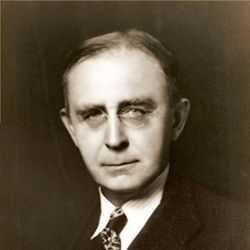Clement Lincoln Bouvé, 1936-1943

Clement Lincoln Bouvé, the third Register of Copyrights, was born in 1878 in Hingham, Massachusetts, to Major Edward T. Bouvé and his wife, Delphine Clement Bouvé. He attended private schools in Germany and Switzerland, as well as the Roxbury Massachusetts Latin School, and graduated from Harvard College and the Harvard Law School. Before beginning to practice law, Bouvé served as secretary to the advisor to the Siamese Government and as assistant district attorney for Manila. He also served as a member of the Panamanian Commission (1915–1916) to adjust claims arising out of the Canal Zone purchase. Bouvé served as agent of the United States (1926–1932) before the General and Special Claims Commission during boundary discussions with Mexico. During nearly thirty years in the practice of international and federal law in Washington, DC, he was associated with the firm of Shuster and Bouvé with offices in the Union Trust Building, now home to the American Bar Association, and was in practice with Edgar Turlington (1932–1935).
During World War I, he was a captain and later a major in field artillery in France and served in confidential assignments in the army of occupation in Germany. In 1920, he retired from the army with the rank of lieutenant colonel and was then known as Colonel Bouvé. After the war, he served on the board of directors of the Navy League of the United States, an organization dedicated to education and to support of naval personnel. An expert in aviation law, he served on the aviation board of New York University’s Air Law Review, wrote for that publication, and lectured on aviation law. He also served on the American Bar Association’s committee on aeronautical law. In 1912, he authored an authoritative 915-page book entitled A Treatise on the Laws Governing the Exclusion and Expulsion of Aliens in the United States and also wrote numerous articles on international law.
Bouvé was appointed Register of Copyrights on August 1, 1936, the first lawyer to serve as Register. He was a firm believer in the registration system, and his administration of the Copyright Office was notable both for the improvements he made in the organization of the Office and for his constant and energetic endeavor to obtain strict compliance with the conditions and formalities fixed by the statute for securing and maintaining copyright, especially the deposit provisions that enrich the collections of the Library of Congress. This effort included the creation of a legal staff, the establishment of an Examining Section to pass in the first instance on all applications, and the formation of a Revisory Board comprising attorneys and other experienced employees to act on applications initially rejected or those presenting unusual problems. An accomplished musician, he was particularly interested in the copyright law as it related to musical works. During his incumbency, the Copyright Office moved in 1939 from the south side of the ground floor of the Jefferson Building to the newly built Adams Building, where the Office originally occupied the entire first floor, the entrance facing Independence Avenue having been designed as the entrance to the Copyright Office.
One of the enduring monuments to Bouvé’s administration is the copyright card catalog, 1938-1945, the first Copyright Office catalog to combine into one alphabet all the entries representing all authors, claimants, and titles for all classes of registered works.
In 1938, he wrote the so-called "Bouvé Letter," a seventy-two-page document bearing the formal title "Letter to the Librarian of Congress concerning Certain Aspects of the Copyright Act of March 4, 1909, in their Relation to the Public Interest and Existing Problems of Copyright Office Administration, with Proposed Amendments." Although this publication did not directly result in any major amendment to the law, it was a model of clarity and served as an example to those who later succeeded in having the statute revised.
Bouvé, a member of the bar of the Supreme Court, the Bar Association of the District of Columbia, and the bar of Massachusetts, had been in ill health when he retired on December 31, 1943. He died suddenly two weeks later on January 14, 1944, and was buried in Arlington National Cemetery. An honorary pallbearer was Admiral John S. McCain Sr., who was then deputy chief of naval operations for air and grandfather of the present senator from Arizona and former presidential candidate John McCain.